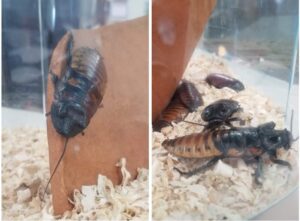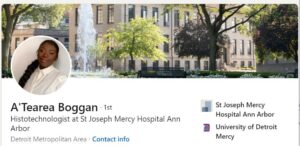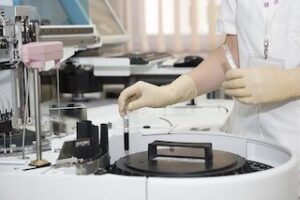I didn’t know about histotechnology, honestly, until I got into it. So I will say get as many skills as you can right now for as little as you can…If it’s a free class, go to it. If it’s like a free seminar, go listen to it. You never know what you can get out of something.
The Pre-Health Department at Detroit Mercy had the honor of interviewing recent Alum and Histotechnologist A’Tearea Boggan. During the interview, A’Tearea recounts fondest memories at Detroit Mercy, explains her current role and what she does as a Histotechnologist and offers advice to students considering a career in healthcare.
I will have to say some of my fondest memories happened on the third floor of Life Science, doing my undergraduate research. Just hanging with Dr. Grabowski and Dr. Belanger was really fun.

With Dr. Grabowski, I was actually his research student so I worked with Madagascar Hissing Cockroaches my entire undergraduate career…I also got to help Dr. Belanger and Dr. Grabowski with prepping the Freshmen Labs a couple years…with Dr. Belanger, I will just go into her lab because she has a cryostat for frozen sections and I will just go in there and bother her sometimes…I will just follow her around.

A’Tearea currently works as a Histotechnologist at St. Joseph Mercy Hospital. During her interview with Pre-Health Advisor Carmen Gamlin, she explains what Histotechnologists does in a hospital setting.
Histotechnicians typically deal with two type of tissues. They deal with permanents, which are paraffin embedded and then they also deal with frozen which are fresh tissues. With the permanents, we deal with fixations, embedding, microtomy and staining.
For my lab specifically, we have a machine that embeds and machine that stains. So that’s kind of done for us but I know some labs are still manual so you will have to physically go through and change everything out.
For embedding we try to make sure everything is in a certain direction…When we embed, we embed it a certain way so when we cut it for the pathologist to look at, everything is uniformed and they can make sure they see every little thing because sometimes there might be a little spec of something that they need more of to make sure that either there are no cell abnormalities or that there are.
For frozens, we typically at my lab we get those tubed in or someone runs them in from surgery. So the person is still under and then we gross, which means to just cut it into smaller sections, embed it, cut it, stain it and then we have to run it out to the pathologists in 20 minutes or less because the person is still under and they still have to diagnose and make sure everything is right.
A’Tearea has this piece of advice for pre-health Titans who are considering a career in Histotechnology or other types healthcare.

I didn’t know about histotechnology, honestly, until I got into it. So I will say get as many skills as you can right now for as little as you can…If it’s a free class, go to it. If it’s like a free seminar, go listen to it. You never know what you can get out of something.
Try not to say no. If there’s an opportunity, try to take it just because you never know where that can lead you! I didn’t know that my four years of research would lead me into that career and then without having to take the actual course, I’m eligible for the certifying exam which I’m studying for right now.



